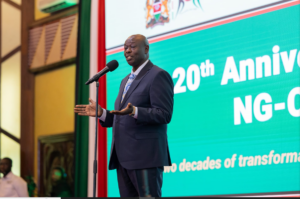Equity Bank’s Assault on Transcentury: A Threat to Kenya’s Economy

BY Milton Were- PR & Communication Expert
In recent news, Equity Bank’s aggressive move to place investment firm Transcentury and its subsidiary East Africa Cables under receivership has sent shockwaves through the nation.
This action should concern every Kenyan who cares about the future of our economy and the preservation of indigenous businesses.
Equity Bank, one of the country’s prominent financial institutions, has appointed joint receivers and administrators to take control of Transcentury and East Africa Cables, effectively stripping their directors of their powers.
In a published advertisement, Equity Bank warned that any individual engaging with these companies without the consent of the receivers would face legal consequences.
Such an audacious move should raise alarm bells among both the private sector and the government. What is at stake here is not just the fate of two companies; it is the health and vitality of Kenya’s economy.
History has shown us that when companies are placed under receivership, their chances of survival diminish drastically. It becomes a death sentence, with receiver managers acting as merciless butchers, interested only in carving up the carcass.
From the demise of Nakumatt to the fall of Karuturi, the pattern is all too familiar. Equity Bank’s path seems to lead to destruction, not revival.
Transcentury, a leading indigenous investment company, holds a special place in Kenya’s business landscape. It has inspired countless Kenyans to form investment clubs, known as chamas, enabling individuals to pool their resources and create wealth together. By threatening the survival of Transcentury, Equity Bank is attacking not only a business but also an entire community of investors and the progress they have achieved.
It is essential to recognize that current laws governing receiverships primarily protect creditors rather than providing avenues to safeguard financially distressed firms.
This imbalance perpetuates a vicious cycle where companies are pushed further into the abyss, leading to job losses, poverty, and economic stagnation.
Equity Bank’s actions perpetuate this destructive trend, posing a significant threat to thousands of Kenyan families who rely on these companies for their livelihoods.
Equity Bank’s track record in handling distressed companies paints a grim picture. There is a pattern of failure and liquidation rather than rehabilitation and revival.
If Equity Bank succeeds in its mission to dismantle indigenous enterprises like Transcentury and East Africa Cables, it will send a chilling message to all aspiring entrepreneurs and investors in Kenya.
Our local businesses, which are the lifeblood of our economy, deserve support and nurturing, not a swift and ruthless end.
As concerned citizens, we must closely monitor the unfolding events and hold Equity Bank accountable for the potential devastation it could inflict on Transcentury and the wider business community. Let us not allow this assault on our national self-interest, jobs, and economic growth to go unchallenged.
Kenya’s future depends on the preservation of businesses like Transcentury, which have shown resilience, created jobs, and fostered wealth for thousands of Kenyans.
Together, let us demand a reversal of Equity Bank’s actions and advocate for reforms in receivership laws that prioritize the revival and sustainability of financially distressed companies.
Only by safeguarding our indigenous businesses can we build a prosperous and inclusive Kenya for generations to come.








